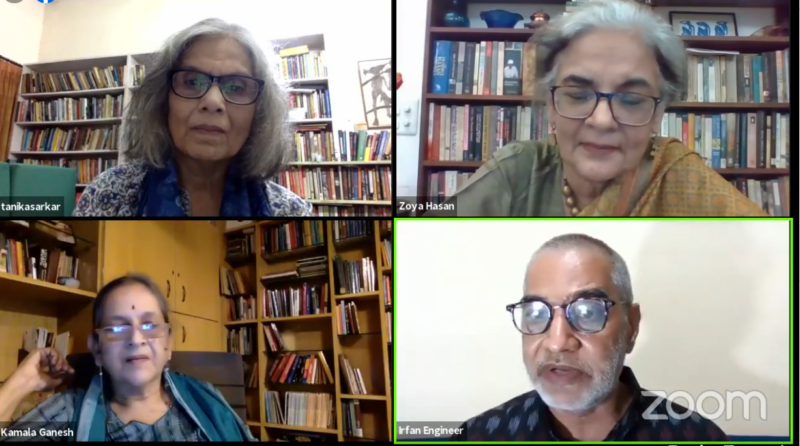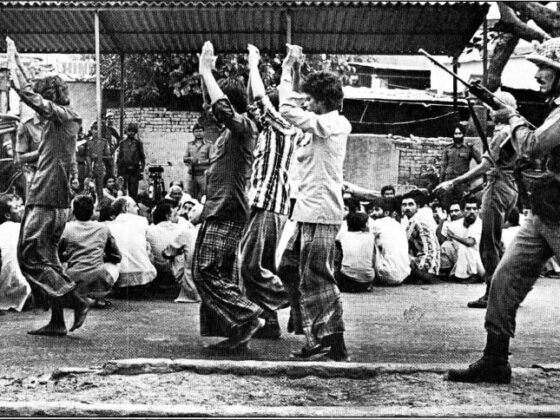Neha Dabhade
(Secular Perspective October 16-31, 2021)
India is a thriving democracy when it comes to elections and peaceful transition in power, but a diminishing democracy when it comes to political freedoms. The regime loudly proclaims its democratic credentials based on its numeric majority in Parliament but this is limited to electoral politics, said prominent scholar and author, Prof. Zoya Hasan while delivering the 18th Dr. Asghar Ali Engineer Memorial Lecture on 9th October, 2021. The Lecture was organized by Centre for Study of Society and Secularism and chaired by Prof. Tanika Sarkar. In the lecture titled “Majoritarian Politics: How the Indian Right is reshaping democracy, Prof Hasan explained the shift from pluralism to majoritarianism under the ruling dispensation since 2014. She pointed out that there is an intersection of majoritarianism and authoritarianism at play which feed on each other to restrict democratic politics. She elaborated this shift towards majoritarianism and authoritarianism in finer details which was highly appreciated by the participants which included prominent scholars, professors and intellectuals. There were more than 150 participants.
Prof. Hasan explained that the shift in the trajectory towards majoritarianism begin in 2014 but got a boost with the victory of BJP in 2019. This was a step towards the consolidation of the project of making of the Hindu Rashtra. The victory in 2019 was followed by quick policies and laws, complemented with a public discourse where Muslims are openly vilified and extralegal violence against them is tolerated. Prof. Hasan outlined the push towards majoritarianism with these three laws: abrogation of Article 370 and 35A, Supreme Court’s verdict on disputed land in Ayodhya and lastly the enactment of the Citizenship Amendment Act, 2019. She said, “ At a political level, these three events challenged the core foundations of the Indian Republic, advancing the discourse of a redefinition of the state and nation in opposition to the secular definition enshrined in the Constitution. Hindu nationalists, on the other hand, saw religion as the strongest basis for a new national identity they were trying to craft. With an absolute majority in Parliament, the regime seems confident that it can begin to operationalise this vision of a Hindu state.”
One of the most visible aspects of the project of establishing the Hindu Rashtra is marginalization of Muslims. Prof. Hasan while explaining this marginalization said, “It is no secret that Muslims are the most under-represented group in public institutions in India. Their representation in the central and state government, armed forces, judiciary, police, and civil services, is extremely low. They exist almost entirely outside India’s formal economy (both the organized private and public sector), since most organized sector or even the unorganized businesses rarely hire Muslims perpetuating economic exclusion regardless of their qualifications. Fewer than 8 percent of urban Muslims formed part of the formal sector while the national average was 21 percent. The institutional marginality of Muslims is perceptible – they have been completely edged out of power structures”.
Prof. Hasan made a significant point that Muslims are not only at the margins of the electoral democracy in India but steadily edged out. Minorities have been completely excluded from the institutional framework of the country. She said, “The BJP has shown that over 200 million Muslims don’t count and electoral majorities can be won without their support. Other parties too are reluctant to give them adequate representation because they fear the charge of minority appeasement and attack as anti-Hindu if they promote Muslims. The deeper purpose behind this has been Hindu consolidation in the larger project of remaking India into a Hindu nation. Muslims have been pushed out of the system first by rendering them irrelevant electorally and then rendering them invisible in the public sphere owing to their electoral inconsequentiality”.
Moving her attention to authoritarianism, Prof. Hasan explained that authoritarianism is characterized in the current regime through the erosion of the system of checks and balances on the unmitigated exercise of executive power and control over state agencies. She said, “Constitutional institutions have had to function for political ends to this extent when there’s no formal declaration of Emergency. This process begins with the undermining of the Parliament and the abandonment of any meaningful discussion. Between 2014 and 2019 Parliament was allowed to scrutinize 26 per cent of bills – down from 60 per cent and 71 per cent in the two previous Parliaments. This has been further reduced since May 2019”.
Prof Hasan in particular discussed the role of the Election Commission of India and the Judiciary which are controlled and not functioning autonomously. The expectation of a neutral and impartial EC has eroded due to some partisan decisions supportive of the ruling party. The breaches of the Model Code of Conduct that haven’t been dealt with impartially, further eroding the credibility of the EC. Prof. Hasan pointed out that the Supreme Court also didn’t discharge its duty to check the Executive. She said, “The Supreme Court’s role in the production of the National Register of Citizens (NRC) in Assam, its judgment in the Ayodhya dispute, its apparent lack of urgency in hearing the challenges against the CAA, abrogation of Article 370 and the unresolved controversy over electoral bonds are seen as a part of a pattern as the Court has simply avoiding pronouncing on controversial cases that strongly affect government interest. The Court has not even taken up habeas corpus petitions as a result people are languishing in jail for months”.
Neutralizing the opposition is one of the expressions of authoritarianism and this trend is starkly visible in India as explained by Prof. Hasan. There in not only an utter disregard but also a denial of legitimacy to the opposition parties particularly the Congress. Prof. Hasan cautioned,” the ruling party seeks dominance by fighting against party based opposition as much dissenting intellectuals, universities, independent journalists, NGOs, and so on. It is not just parliamentary opposition that the BJP has been targeting, it was opposition from left-wing ideas also which it considered not only illegitimate but also illegal”. Prof. Hasan summed up that, “the control the central government exerts over key institutions has enabled the BJP to reshape the Indian state and democracy during its second term as the checks and balances intended to restrain executive power have been diluted”.
Prof. Hasan concluded her lecture on a positive note by recounting that this trend of majoritarianism and authoritarianism can change given the growing resistance to the authoritarian policies of the government. She particularly was impressed with the anti- CAA protests and farmers’ protests which can be beacon of hope for democracy. Prof. Hasan said, “several modes of resistance have gathered momentum outside traditional party politics in response to increasing polarization and to the far-reaching restructuring of democracy which has proceeded apace. Citizens have made use of various forms of political resistance and dissent. Major public protests most notably the popular resistance against the CAA and the sustained farmer’s movement has put the government on the back foot. Even if protests and dissent do not have an immediate electoral impact, they do open the door for a gradual erosion of authoritarianism”.
Prof. Tanika Sarkar, prominent scholar, in her Chair remarks while congratulating Prof. Zoya Hasan for a comprehensive Lecture also expressed her concern about the threat to Indian democracy. She said, “The freedom to vote alone cannot ensure the survival of democracy. And that’s all we seem to be left with right now.” She pointed out that not only was there a fragmented opposition which is intimidated and stifled by the ruling dispensation but also the electorate is indifferent to growing issues while voting. Despite of the people’s movements like anti-CAA, farmers’ movement etc, there is no dent in the electoral success of the Hindu Right. There is normalization of violence Dalits, Muslims, women and activists. She lamented that though the clear and stated agenda of the Hindu Right has been Hindu Rashtra, the opposition has failed to communicate what democracy and secularism means in the psyche of the electorate. This point she felt required introspection.
This boldly analyzed lecture was very well received and also evoked many questions which were brilliantly answered with balanced and sharp insights of the speaker and chair. It was a befitting tribute to the rich legacy of Dr. Asghar Ali Engineer. In the past, the Dr. Asghar Engineer Memorial Lectures have been delivered by celebrated scholars including Romila Thapar, Mushirul Hasan, Irfan Habib, Syeda Hamid, Harbans Mukhiya and Christophe Jaffrelot.







